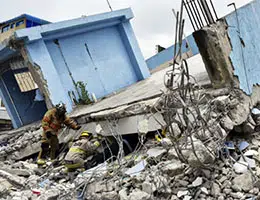 A misfortune is an event that causes suffering or sadness . The concept also refers to the situation suffered by someone who is going through a painful moment . For example: "The Spanish president expressed solidarity with the misfortune suffered by the Haitian people" , "The closure of the company was a disgrace for hundreds of neighbors" , "The misfortune was present in the family when, in an accident, they died the couple's two children."
A misfortune is an event that causes suffering or sadness . The concept also refers to the situation suffered by someone who is going through a painful moment . For example: "The Spanish president expressed solidarity with the misfortune suffered by the Haitian people" , "The closure of the company was a disgrace for hundreds of neighbors" , "The misfortune was present in the family when, in an accident, they died the couple's two children."
The idea of misfortune can refer to adversity . Suppose a city is destroyed by an earthquake . This natural disaster not only demolishes houses and infrastructure, but also causes thousands of fatalities. It can be said, therefore, that the locality in question suffered a misfortune.
Another possibility is to link misfortune to bad luck . In this context, an unfortunate event is unfortunate. Suppose that a person who is enjoying his vacation on a Caribbean beach slips in the hotel bathroom and breaks his leg. The subject can define what happened as a misfortune.
Misfortune is also the circumstance that surrounds someone who has lost a friendship , a favor , a privilege or recognition : “Since the coach publicly criticized him, the young forward fell from grace,” “Don't worry, I will never allow you to fall from grace.” ” .
This term can also be used in less serious situations, even to describe things of little importance, with varying degrees of exaggeration. In small talk, one person may tell another person that the car they bought is "a disgrace," or "a disgrace of a car," to refer to the large number of problems it has given them in the few days since. been using it. It would not be the same if you had had a major accident with him: although you could use the same expressions, the intonation and weight of the words would be completely different.
 Semantics often opens the doors to debate and discussion, since language is not something rigid and exact, but rather a very complex system in which many elements are combined in addition to words. The context is one of the most defining: as can be seen in the previous paragraph, the same expression can have two very different connotations depending on the facts that surround and evoke it, and this will be largely reflected in the intonation and intensity. with which the sender pronounces it.
Semantics often opens the doors to debate and discussion, since language is not something rigid and exact, but rather a very complex system in which many elements are combined in addition to words. The context is one of the most defining: as can be seen in the previous paragraph, the same expression can have two very different connotations depending on the facts that surround and evoke it, and this will be largely reflected in the intonation and intensity. with which the sender pronounces it.
In everyday speech it is possible to describe anything that bothers us as "a misfortune", as can be seen in the following example sentences: "He calls us every day at the same time with new problems, it is really an endless misfortune" , "What a disgrace, it seems that bad luck is following you!/" , "These neighbors are a disgrace, but at the moment I don't have the possibility of moving, so I will have to continue putting up with them for a few months" .
The South African writer JM Coetzee , finally, is the author of a novel whose original title is “Disgrace” and which came to our language as “Desgracia” . This book, published in 1999 , allowed Coetzee to win the Booker Prize .
Broadly speaking, the plot of the book Misfortune puts us in the shoes of a university professor named David Lurie , a fifty-two-year-old man with an unenviable life . He is burdened by two divorces and life does not seem very exciting for him, although the bad decision to have sexual relations with a student gives a twist that is as difficult as it is revealing to his story. In 2008, Australian director Steve Jacobs brought it to the big screen, starring John Malkovich in the lead role.
